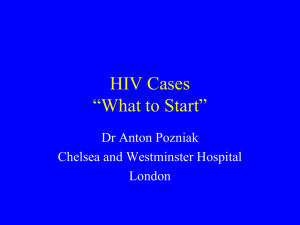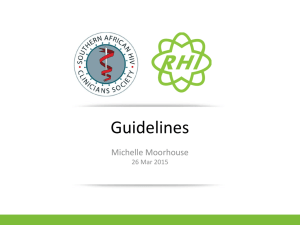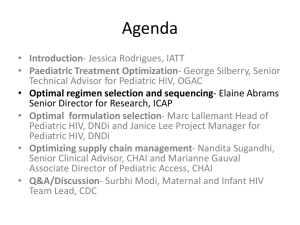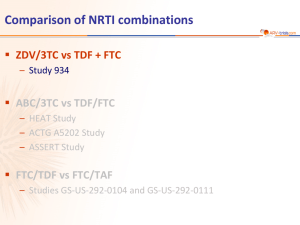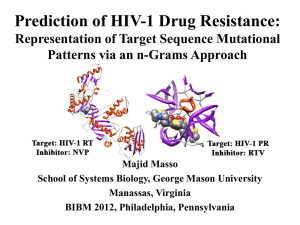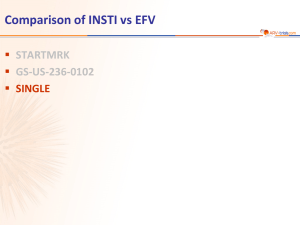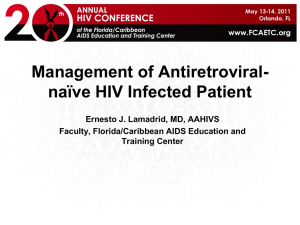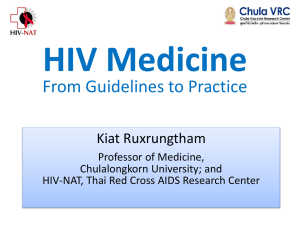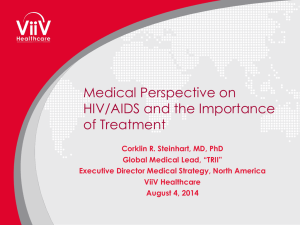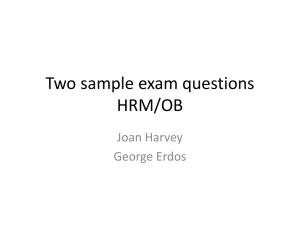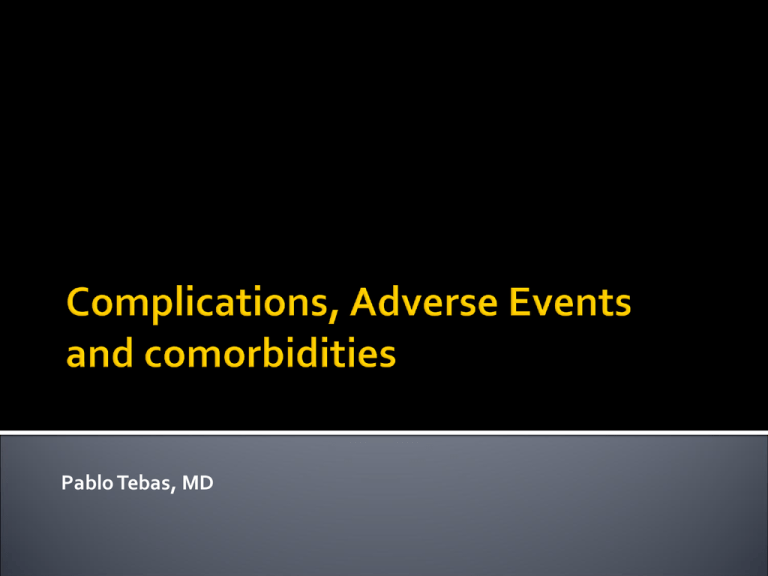
Pablo Tebas, MD
ACTG 5202/5224s
STARTMRK Metabolic Study
STEAL (abacavir and inflammatory markers)
EUROSIDA and risk of CKD
HOPS and risk of fractures
Vitamin D studies
Cancer studies
Hepatitis
A5224s
A5224s
A5224s
TC
LDL
HDL
TG
29
13
8
24
ABC/3TC
ATV/r
40 Lipids (Week
21 48, mg/dL)
12
Median Change in Fasting
15
<0.001
0.002
<0.001
0.26
ATV/r
10
2
5
14
EFV
22
10
8
13
<0.001
0.002
<0.001
0.26
EFV
P-value
TDF/FTC
P-value
In low HIV RNA stratum, in comparison between ABC/3TC vs. TDF/FTC: significantly greater increase in
TC, LDL, HDL with both EFV and ATV/r; greater increase in TG with ATV/r
Change in Calculated Creatinine Clearance, (mL/min)
Week 48
Week 96
ATV/r
3.1
6.1
EFV
4.3
7.8
P-value
0.17
0.33
ATV/r
-0.9
-2.6
EFV
4.1
4.9
0.001
<0.001
ABC/3TC
TDF/FTC
P-value
Daar E, et al. 17th CROI; San Francisco, CA; February 16-19, 2010. Abst. 59LB.
*
*
* -linear regression
No significant interaction of NRTI and NNRTI/PI components (p=0.63)
A5224s
*
*
* -linear regression
No significant interaction of NRTI and NNRTI/PI components (p=0.69)
A5224s
A5224s (n=269)
5.6% had ≥ 1 fracture (all traumatic)
No statistically significant differences between NRTI components or
NNRTI/PI components in fracture rate (Fisher’s exact) or time to first
fracture (log-rank test)
A5202 (n=1857)
4.3% fracture rate (12.7% of those atraumatic)
No statistically significant differences between NRTI components or
NNRTI/PI components in fracture rate (Fisher’s exact), incidence or time
to first fracture (log-rank test)
% with ≥ 1
fractures
Incidence per
100 pt-year
TDF/FTC
+EFV
(n=464)
TDF/FTC
+ATV/r
(n=465)
ABC/3TC
+EFV
(n=465)
ABC/3TC
+ATV/r
(n=463)
Total
(n=1857)
4.5%
4.5%
4.7%
3.4%
4.3%
1.8
1.8
1.9
1.4
1.7
A5224s
% Limb fat
loss from 0
to 96 weeks
≥ 10%
Primary
≥ 20%
Post hoc
TDF/FTC
+EFV
(n=56)
TDF/FTC
+ATV/r
(n=45)
ABC/3TC
+EFV
(n=53)
ABC/3TC
+ATV/r
(n=49)
Total
(n=203)
14.3%
15.6%
18.9%
16.3%
(7.5%,28.8%)
16.3%
(6.4%,25.3%)
(7.0%,28.6%)
(9.4%, 31.6%)
8.9%
0%
3.8%
(11.8%, 22.0%)
6.1%
4.9%
No statistically significant differences between NRTI
components and NNRTI/PI components (Fisher’s exact test)
A5224s
*
*
* -linear regression
No significant interaction of NRTI and NNRTI/PI components (p=0.67)
A5224s
*
*
* -linear regression
No significant interaction of NRTI and NNRTI/PI components (p=0.66)
A5224s
Bone
All regimens appeared to produce an initial bone loss with subsequent
stabilization or even improvement after week 48
TDF/FTC led to greater BMD loss in hip and lumbar spine than ABC/3TC
ATV/r led to greater BMD loss in lumbar spine (but not hip) than EFV
Fractures were similarly distributed among study arms
Fat
Regimens containing TDF/FTC or ABC/3TC increased limb fat and trunk
fat and were not significantly different
ATV/r led to greater gain in limb fat and trunk fat than EFV
Lipoatrophy, even the mild protocol-defined form, occurred in 16%
(95% CI 12-22 %) of the participants and was not significantly different
between TDF/FTC and ABC/3TC or between EFV and ATV/r
A5224s
Randomized, double-blind study
comparing RAL vs EFV, both
with TDF/FTC
Week 96 lipids (all pts, n=563)
‡
‡
‡ p <0.001
* P =0.025
‡
EFV increased TC, HDL-C,
LDL-C, TG, and glucose sig
more than EFV
No sig difference in total/HDL
chol ratio
Dexa substudy (n=111)
Overall, limb fat increased over
time
By week 96, 3/37 pts on RAL, 2/38
on EFV had >20% loss of limb fat
DeJesus E, et al. 17th CROI; San Francisco, CA; February
16-19, 2010. Abst. 720.
Raltegravir Group 55
Efavirenz Group 56
‡
*
Mean Percent (%) Change (SE) in
Appendicular Fat Over Time
18.1
18.2
17.7
Number of Contributing Patients
40
46
17.0
37
38
Quebec nested case control
125 MIs 1084 Control
Mild association
VA cohort
19424 patients 278 MIs
No association with ABC
Bedimo et al.
MOAB202
Durand et al.
TUPEB175
HIV +
Suppressed on 2
NRTI + PI or
NNRTI
(N=357)
T DF/FTC FDC
n=179
ABC/3TC FDC
n=178
Primary Results:
Similar virologic results
Increased risk of CV events in ABC/3TC group (8 ABC/3TC vs 1 TDF/FTC, p=0.48) not
explained by lipid changes
No difference in renal outcomes
Loss of bone density in TDF/FTC vs gain in ABC/3TC group
Inflammatory Marker Substudy
14 biomarkers (inflammatory/renal, thrombotic, endothelial function) measured at
weeks 0, 12, 24, and 48
Primary analysis (change from week 0-12): No significant association between use of
ABC/3TC and change in markers
Alternative explanation for ABC/3TC association with CVD needed
Martin A, et al. Clin Infect Dis. 2009 Nov 15;49(10):1591-601; Emery S, et al. 17th CROI; San Francisco, CA; February 16-19, 2010. Abst. 718.
Analysis of patients with ≥3 creatinine measurements + body weight, 2004
6,842 patients with 21,482 person-years of follow-up
Definition of CKD (eGRF by Cockcroft-Gault)
If baseline eGFR ≥60 mL/min/1.73 m2, fall to <60
If baseline eGFR <60 mL/min/1.73 m2, fall by 25%
225 (3.3%) progressed to CKD
Cumulative Exposure to ARVs and Risk of CKD
Univariable
Multivariables
IRR/year
95% CI
P-value
IRR/year
95% CI
P-value
Tenofovir
1.32
1.21-1.41
<0.0001
1.16
1.06-1.25
<0.0001
Indinavir
1.18
1.13-1.24
<0.0001
1.12
1.06-1.18
<0.0001
Atazanavir
1.48
1.35-1.62
<0.0001
1.21
1.09-1.34
0.0003
Lopinavir/r
1.15
1.07-1.23
<0.0001
1.08
1.01-1.16
0.030
• Risk factors for CKD on TDF: age, HTN, HCV, lower eGFR, lower CD4+ count
Kirk O, et al. 17th CROI; San Francisco, CA; February 16-19, 2010. Abst. 107LB.
Comparison of HOPS cohort (n=8456) vs
National Hospital Discharge Survey and
National Hospital Ambulatory Care
Medical Survey
Adjusted for age and gender
Gender-adjusted rates of fracture
among adults aged 25-54 years
HOPS*
P = 0.01
Fractures: 276 during median
4.8 yrs follow-up
Risk factors for fractures
Age >47
Nadir CD4+ count <200
HCV co-infection
Diabetes
Substance use
Conclusion: Fracture rates are higher in
HIV infected population and rate is
increasing with age
* Indirectly standarized using rtes from NHAMCS-OPD data
Dao C, et al. 17th CROI; San Francisco, CA; February 16-19, 2010. Abst. 128.
NHAMCS-OPD
P = 0.32
Vitamin D Deficiency is Not Influenced
By ART
Retrospective seasonal analysis
of Vitamin D deficiency within
Swiss cohort
Started ARV in: Fall (n=108);
Spring (n=103)
75% men; age = 37;
White = 87%; CD4+ 227;
BMI = 22.9
ARVs: TDF – 17%;
NNRTIs – 43%; PI -56%
Conclusions
Vitamin D deficiency is common,
but seasonal
Blacks are at increased risk
NNRTI use a risk factor
Mueller N, et al. 17th CROI; San Francisco, CA; February 16-19, 2010. Abst. 752.
Fall
(n=108)
Spring
(n=103)
14%
42%
Insufficiency
62%
53%
Target Level
24%
5%
14%
47%
Insufficiency
63%
48%
Target Level
23%
5%
18%
52%
Insufficiency
59%
38%
Target Level
23%
10%
Baseline before cART
Vitamin D Deficiency
12 Months after cART Start
Vitamin D Deficiency
18 Months after cART Start
Vitamin D Deficiency
Deficiency
Target
<30 nmol/L
≥75 nmol/L
Cancer type
Study of cancer risk in AIDS
patients from 1980-2006
(n=372,364)
Predominantly male (79%),
non-hispanic black (42%),
MSM (42%)
Median age of 36 years at
the onset of AIDS
Cancer risk in years 3 - 5
after AIDS onset increased
for AIDS but also Non-AIDS
defining cancers
Simard E, et al. 17th CROI; San Francisco, CA; February 16-19, 2010. Abst. 27.
No cases
SIR
95% CI
Kaposi sarcoma
3136
5321
5137 - 5511
Non-Hodgkin
lymphoma
3345
32
31 - 33
Cervical cancer
101
5.6
5.5 - 6.8
AIDS-defining cancers
Non-AIDS-defining cancers
Anal cancer
219
27
24 - 31
Liver cancer
86
3.7
3.0 - 4.6
Lung cancer
531
3.0
2.8 - 3.3
Hodgkin lymphoma
184
9.1
7.7 - 11
All non-AIDS
related cancers
2155
1.7
1.5 - 1.8
VA-Cohort
(3,707 HIV-positive patients)
Predominantly
male (98%),
white (43%)
Median age of 47 years
Lung cancer risk factors
- smoking and drug abuse
more often among HIV+
- Similar rates of COPD
Sigel K, et al. 17th CROI; San Francisco, CA; February 16-19, 2010. Abst. 30.
26 cases per
10,000 pt-yrs
15 cases per
10,000 pt-yrs
Factors Associated with Liver Related
Events by Cox Regression Analysis
Effect of non-SVR on Risk of New ADC and Non-Liver
Related Death by Cox Regression Analysis
Factor
Adjusted HR
(95% CI)
P
Non-SVR
vs SVR
8.92
(1.20-66.11)
.032
F3-F4
vs F0-F2
4.96
(2.27-10.85)
Geno 1-4
vs 2-3
1.35
(0.63-2.88)
.443
HCV RNA
<500K IU/mL
0.73
(0.33-1.62)
.444
CDC category
C vs A/B
0.95
(0.49-1.87)
.327
Nadir CD4
cells
0.99
(0.99-1.00)
0
1
10
New ADC
.000
.319
Non-liverrelated
death
New ADC
and nonliverrelated
death
0
1
100
Liver-related events include: liver-related death, lever
decomposition, hepatocellular carcinoma , and transplantation
Berenguer, J. et al. Hepatology 2009;50:407-413; Berenguer, J, et al. 17th CROI; San Francisco, CA; February 16-19, 2010. Abst. 167.
10
HR (95% CI)
P
3.60 (1.14-9.21)
.008
3.24 (1.08-9.74)
.06
3.50 (1.22-10.0)
.019
2.60 (1.63-6.68)
.135
3.30 (1.63-6.68)
.001
2.86 (1.24-6.55)
.013
Crude
Adjusted
Recent studies demonstrate polymorphisms near interleukin 28 B (IL28B) gen
predict sustained virological response (SVR) to treatment with Peg-IFN + RBV
in HCV-monoinfected pts harboring genotype 1
Study assessing potential role of theIL-28B treatment induced clearance of
rs12979860 polymorphism in acute and chronic hepatitis C in HIV-positive
patients
HIV(+)/acute hepatitis C
HIV(+)/chronic hepatitis C
100
P=n.s.
100
P=0.039
P=0.008
75
%SVR
75
%SVR
HIV(-)/HCV(+)
100
50
75
%SVR
50
50
25
25
25
0
0
0
C/C
C/T
T/T
IL28B genotype
C/C
C/T
T/T
IL28B genotype
Rauch A. 17th CROI; San Francisco, CA; February 16-19, 2010. Abst. 162; Natterman J, et al. ibid., Abst. 164; Rallon N, et al. ibid. , Abst. 165LB.
C/C
C/T
T/T
IL28B genotype
Rs12979860 and SVR
Predictors of SVR
P = 0.684
11.9
HCV-RNA
<500,000 IU/ml
P <0.001
8.0
HCV
Genotype 3
Rs12979860
CC Genotype
Liver Fibrosis
Stage F0-F2
P <0.001
3.7
P=0.002
3.5
P=0.009
Rauch A. 17th CROI; San Francisco, CA; February 16-19, 2010. Abst. 162; Natterman J, et al. ibid., Abst. 164; Rallon N, et al. ibid. , Abst. 165LB.

